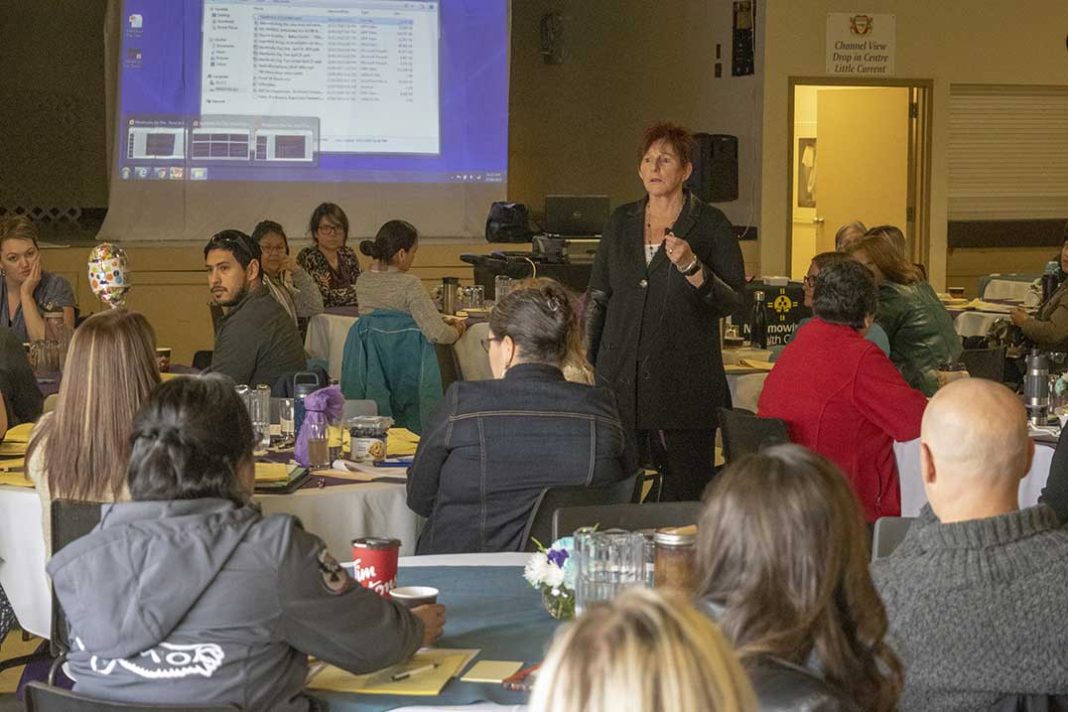LITTLE CURRENT – Noojmowin Teg Health Centre invited clinical psychologist Dr. Lori Haskell to a two-day workshop that enabled individuals across a wide spectrum of professions, backgrounds and skillsets to better understand the neurobiological and psychological effects of violence and abuse.
“I first met some people from Noojmowin Teg last fall in Sault Ste. Marie and they wanted to bring these resources to their community. These messages are significant to many types of people like police, social workers, family support workers and community planners. It’s nice to have such a diverse group here because everyone understands a bit better,” said Dr. Haskell.
This two-day event centred on discussing some support programs that are in place to assist both people who struggle with developmental and other traumas in their life, as well as the care providers who take on the responsibility for their mental, emotional and physical well-being.
“Everyone has something they can offer. Often people look at healing trauma and see that it’s a lot of challenging work, but there are tons of smaller places where people can make interventions. Then everyone can feel more effective,” said Dr. Haskell.
A significant portion of the discussions involved ways of interacting with vulnerable people to show them that they care about, and are listening to, their concerns and experiences. Dr. Haskell emphasized the magnitude of the impacts that traumatic experiences can have on a person.
“People often don’t understand that early, developmental trauma, especially from one’s childhood, it isn’t just something that’s in their memory. It changes how their brain is wired, their ability to be comfortable in their body and how they interact with others. (Developmental trauma) is truly the heart of most addictions,” said Dr. Haskell.
“The key takeaway is to trust in each other, and that you want to show some sensitivity when dealing with people. I think the many different types of people here today are looking to find gaps in their resources and bring more skill sets in so they can address those gaps,” she said.
Careers ranging from justice professionals to those in the medical field were present in the audience, including pharmacy student Bradley Murphy who is currently working in a placement in Mindemoya.
“We haven’t gotten formal education with these groups of individuals. In previous rotations, we’ve had patients who have experienced sexual abuse but we never knew how to interact with them and direct the right resources to them. I can understand how traumas can develop over time,” Mr. Murphy observed.
“This will help to treat patients better and in a holistic manner; you can treat them as a whole, not just as patients, but individuals.”
Michelle Hrynyk of Tehkummah was in attendance at the conference. She started N’de Nibimwidoon, or ‘I Carry My Heart,’ with Anishinaabe elders, a seven-day land-based program that works with Anishinaabe-kwe to increase their resistance to the impacts of sexual assault.
Ms. Hrynyk said the relatively new concept of neuroplasticity—the ability to reshape one’s brain and how it functions, a concept that has gained strength in the latter portion of the 20th century—forms a key part of the work she offers through her practice.
“There’s a lot of things, including going to residential schools or being part of the 60s Scoop, or youth who live in poverty, that can effect developmental trauma and how their brains are wired, how people feel about themselves or how they relate to others,” said Ms. Hrynyk. “Once we look at how developmental trauma affects the brain, we will better know how to support others in their healing.”
She added that a significant teaching from the conference was the separation between simple trauma and complex or developmental trauma. Developmental trauma refers to “adverse childhood experiences” that occur steadily within a child’s own home or with a trusted caregiver. This includes emotional, verbal or physical abuse, emotional or physical neglect or any one of a number of household dysfunctions such as substance abuse, mental illness or a broken family. Like developmental trauma, complex trauma is generally something that happens repeatedly, but not necessarily during a child’s development. This differs from simple trauma, which results from a single event.
Noojmowin Teg’s former manager of mental health and addictions programs Melanie Stephens acknowledged the Ontario Ministry of the Attorney General for providing funding for the cultural support, counsellor and navigator programs which were integral to this event. She said this region does not offer supports on the level at which it should.
“We’re really under-resourced on Manitoulin in terms of the people with the knowledge to meet the unique needs of sexual assault and domestic violence survivors,” said Ms. Stephens.
“This event, and others that we run, are about bringing opportunities forward for learning and trying to advance the care for our populations.
Noojmowin Teg and Manitoulin Family Resources are the only two dedicated services on Manitoulin for sexual assault survivors. She said she hopes to be able to expand the program in the future beyond its current constraints to better serve the communities across the Island.
“A trauma-informed approach applies to more than just sexual assault and domestic violence. It’s part of a whole cycle from early intervention to everything in primary care, mental health and social services. It’s very important,” said Ms. Stephens.
She added that Noojmowin Teg has a unique advantage in that it synthesizes lessons, techniques and best practices from a variety of sources.
“We really have an opportunity to blend Western and traditional approaches locally into a holistic model. There’s benefits from both approaches for our clients,” she said.
In addition to the main addresses from Dr. Haskell, there were also elder teachings on topics such as the significance of the medicine pouch, opportunities for questions and a chance for the attendees to apply what they had learned.
Key takeaways from Dr. Haskell’s presentations included the importance and power of making meaningful connections to others, certain ways the brain works when it faces stressful, trauma-awakening situations and the importance of finding common ground to foster the healing process.
The overall theme of the event might be succinctly summarized in a message on the reverse of Ms. Hrynyk’s business card: “healing doesn’t mean the damage never existed. It means the damage no longer controls our lives.”





